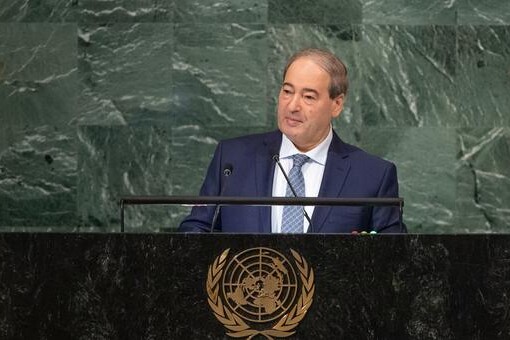Blaming a deadly combination fighting, climate change, COVID-19 and rising food and fuel costs, he said, “Mothers are telling me that with the upcoming winter they are caught between a rock and a hard place”.
“They either feed their children, and let them freeze, or keep them warm and let them go hungry. They cannot afford both fuel and food”, added the WFP chief spelling out that the deadly mix is “pushing people beyond their limits”.
Levels of food insecurity across #Syria are at record highs. Thank you @BelgiumMFA for providing lifesaving assistance to 270,000 vulnerable people at this critical time.
Together we are helping families who need our help more now than ever before. pic.twitter.com/pFYQyf9qKF
— WFP Syria (@WFP_Syria) November 10, 2021
Choosing who eats
During his travels, Mr. Beasley spoke to mothers in nutrition and food distribution centres who elaborated on the hard choices they are forced to make to survive.
A mother of four in Aleppo described her daily struggles.
“We are tired, worn out and now hungry too as the economic situation takes its toll”, she said.
She explained that she has not been able to get any fresh food, dairy or eggs for her children for the last four months and had to make difficult decisions, “like deciding which of my children should eat on the basis of who is most fragile and sick or who will slip into severe malnutrition if not fed today”.
Syria breaks food insecurity record
Some 12.4 million people, or almost 60 per cent of the population, are now food insecure and do not know where their next meal will come from – a 57 per cent increase since 2019 and the highest number ever recorded in the history of Syria, said the UN agency.
The country’s agricultural sector struggles to produce enough to meet the population’s needs as food prices across the country reached record highs in September.
The price of a basket of staple foods has more than doubled since last year and is now beyond the reach of millions of families.
Avoid desperate actions
Moreover, record lows in both rainfall and Euphrates River levels are affecting 3.4 million people as wheat and barley producing governorates report significant losses.
At the same time, the impact of the financial crisis in neighbouring Lebanon, the declining value of the Syrian pound and the long-term effect of COVID-19 have all contributed to the country’s economic downturn.
“History has shown us that if we do not help people before they become destitute, they will take drastic measures and we will see mass migration”, warned the top WFP official.
They either feed their children, and let them freeze, or keep them warm and let them go hungry – WFP chief
Saving lives
Each month, WFP assists over five million people with food assistance across Syria.
But the agency faces severe funding constraints and was recently forced to reduce the size of the monthly food ration that families receive.
With only 31 per cent of WFP’s operations in Syria funded, the UN agency urgently needs close to $480 million for the next six months.
“It is cheaper to help people where they are than to do so after they have fled their homes and became refugees in other places. We need the resources to be able to save lives and stabilize the situation”, concluded Mr. Beasley.



